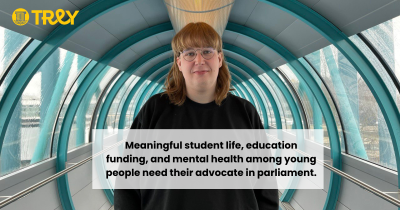It should be news to nobody that it’s time for the parliamentary election again. On 2nd April 2023, we will elect a parliament that will steer Finland’s course at least for the next four years.
Four years is a long time in the life of a student in higher education. In that time, you’re meant to complete your BA degree and half of your MA studies. Four years ago, there were no signs of the COVID-19 pandemic, and the new and improved Tampere University had just begun its operations at the beginning of the year. Four years is next to nothing in politics, but it sure is a long time for a university student.
Students really should be interested in the parliamentary election, as the next parliament will strongly determine the future of students’ income and wellbeing as well as university funding. The student financial aid was only four euros more in the spring of 2023 than it was in 1992. There have been no index-based increases and purchasing power has gone south like geese in winter. All other social security benefits are better than student financial aid, and no other group is expected to get into debt just to secure their livelihood.
Students in higher education are campaigning for a 100€ increase to the study grant. With this, the study grant would rise to around the same level as it was before the 2017 cuts, about as high as in Iceland. At the same time, we are trying to prevent students from being removed from the general housing allowance and to keep students a part of the general reform of social securities.

Many of us surely remember the party leaders who posed with signs saying ‘koulutuslupaus’ (education promise). The new government program, which will be negotiated based on the election’s results, will determine whether university funding is increased or cut down in the next four years. Although national debt is always a point of concern, we cannot afford to take more away from students and education.
Finland has set a national goal to increase the amount of highly educated youth to 50% by the year 2030. This requires purposeful and permanent investment in education. It is impossible to sustainably increase student intake without permanent funding. If intake is increased without proper funding, it raises questions about the quality of education. In a more concrete sense, we can ponder the possibility of increasing student intake without skyrocketing the number of exam courses and online teaching. It’s just not possible, at least not without funding.
If you’ve ever been in line at FSHS – and who hasn’t, honestly – turn your gaze towards the parliament. The parliament decides on FSHS funding, and the FSHS’s core funding cannot withstand the demand for, for example, mental health services for students. In practice, we see this in long queues as well as in student queues migrating even in the public sector services or in the university’s support services. There is no singular solution to the mental health crisis, but rather it requires proper investment. For university students, those investments best serve their purpose when aimed at the FSHS.
Meaningful student life, education funding, and mental health among young people need their advocate in parliament. No one else will stand up for us students except ourselves. In the parliamentary election of 2019, about 60% of young adults voted, when general voter turnout was at 71,4%. To ensure that matters important to students are visible in parliament, we students need to vote.